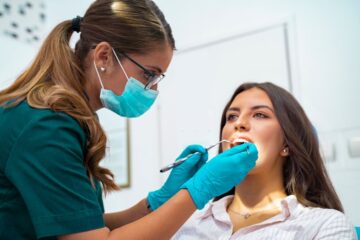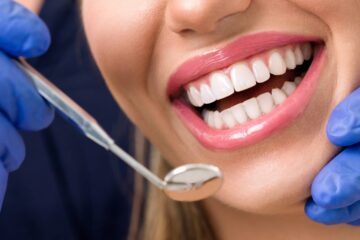Navigating the world of orthodontic treatment can sometimes feel like tiptoeing through a minefield of myths and facts, especially when it comes to the fear that braces or Invisalign might lead to your teeth toppling like delicate dominos. You’ve heard the horror stories, whispers from a friend of a friend, which may have planted seeds of doubt in your mind about the safety of these dental procedures.
As a professional, it’s crucial to address these concerns head-on, separating fact from fiction without causing unnecessary alarm. You’re probably wondering whether there’s any truth to the tales, or if you can breathe a sigh of relief and smile confidently in the mirror.
So, let’s uncover the real risks and concerns associated with orthodontic treatments, and consider how proper care can ensure the health and stability of your pearly whites for years to come.
Key Takeaways
– Braces and Invisalign do not cause teeth to fall out.
– Tooth movement during orthodontic treatment is carefully planned and monitored by professionals.
– Following instructions and maintaining good oral hygiene minimises risks associated with orthodontic treatment.
– Regular check-ups and proper care are crucial for ensuring long-term dental health.
Understanding Orthodontic Treatment
Orthodontic treatment, whether through braces or Invisalign, involves carefully applied pressure to your teeth to guide them into a more ideal alignment. This tooth movement is a cornerstone of orthodontic care and is meticulously planned by your orthodontist. While you may worry about the intensity of this pressure, it’s designed to be gentle yet effective over time, ensuring that your teeth move without causing harm or leading to them falling out.
With various orthodontic options available, choosing between traditional braces and Invisalign depends on your specific dental needs, lifestyle, and preferences. Braces consist of brackets and wires that apply continuous pressure to teeth, gradually shifting them. They’re particularly effective for complex cases and can address a wide range of alignment issues.
Invisalign, on the other hand, uses a series of custom-made, clear aligners that fit snugly over your teeth. These aligners are replaced every few weeks to keep teeth moving toward the target position. They offer the convenience of being removable and are less noticeable than braces.
Both treatment methods are designed to move teeth slowly. It’s critical to follow your orthodontist’s guidance and maintain excellent oral hygiene to ensure the health and stability of your teeth throughout the process.
The Myth of Falling Teeth
While concerns about the safety of tooth movement are common, it’s a myth that braces or Invisalign cause your teeth to fall out. This notion is one of the most pervasive tooth movement myths and is steeped in orthodontic fallacies rather than fact.
It’s crucial to understand that braces and Invisalign are designed to move teeth gradually and safely within the jawbone.
Orthodontic treatments are carefully planned by professionals who consider the health and stability of your teeth and gums. They use precise forces to shift teeth into better positions, a process that’s meticulously monitored over time. If you’re following your orthodontist’s instructions and maintaining good oral hygiene, the risk of any serious complication, including tooth loss, is minimal.
To debunk this myth further, recognize that orthodontists have years of specialised training in the movement of teeth and the development of the jaws. They know how to prevent excessive strain that could potentially harm your teeth or their supporting structures. The notion that professionally supervised orthodontic treatment could cause your teeth to fall out simply doesn’t hold up under scrutiny.
Trust in the expertise of your orthodontist and the resilience of your own dental anatomy to dispel these unfounded fears.
Real Risks and Concerns
Although braces and Invisalign are generally safe, it’s important to be aware of potential risks such as tooth resorption, gum recession, and root damage that can occur if the treatment isn’t properly managed. These orthodontic treatments are designed to move your teeth into better alignment, but they must be administered with care to prevent unwanted outcomes.
When considering braces or Invisalign, keep these real risks in mind:
– Teeth Sensitivity: Your teeth may become more sensitive during and after treatment due to the pressure applied to move them.
– Gum Disease: Poor oral hygiene during treatment can lead to gum disease, which can exacerbate tooth movement and sensitivity.
– Tooth Resorption: A rare but serious condition where the root of a tooth shortens during orthodontic treatment, potentially leading to tooth loss.
– Root Damage: Excessive force or prolonged treatment can cause damage to the roots of your teeth, potentially resulting in instability or tooth loss.
It’s paramount to follow your orthodontist’s advice, maintain excellent oral hygiene, and attend regular check-ups to mitigate these risks. With professional oversight, the likelihood of experiencing severe complications is greatly reduced, ensuring a safe and effective path to a healthier smile.
Proper Care During Treatment
To minimise the risks associated with braces or Invisalign, it’s crucial that you adhere to a stringent oral hygiene regimen and follow your orthodontist’s specific care instructions throughout the treatment period. This means diligently brushing and flossing your teeth to prevent the buildup of plaque and bacteria that can lead to decay and gum disease. Both of these can jeopardise the health and stability of your teeth during orthodontic treatment.
Treatment hygiene isn’t just about brushing and flossing; it also involves avoiding foods that can damage your braces or Invisalign aligners. Sticky, hard, and chewy foods can dislodge brackets or warp aligners, potentially extending your treatment time and compromising the outcomes.
Appointment adherence is equally critical to the success of your treatment. Your orthodontist schedules regular check-ups to adjust braces or provide new Invisalign aligners and to monitor progress. Missing these appointments can delay your treatment and affect the final results.
If you’re experiencing any issues with your braces or aligners, don’t hesitate to contact your orthodontist. Promptly addressing any concerns can prevent further complications.
Ensuring Long-Term Dental Health
Maintaining your dental health extends beyond the period of wearing braces or Invisalign; it’s about adopting habits that safeguard the well-being of your teeth for years to come. Tooth longevity is influenced by consistent care and debunking dental myths that can lead to improper practices.
Here’s how you can ensure your teeth stay healthy long after your orthodontic treatment:
– Regular Dental Checkups: Keep up with your dentist appointments to catch potential issues early.
– Proper Oral Hygiene: Brush twice a day, floss daily, and use mouthwash to prevent plaque buildup.
– Balanced Diet: Eat foods that promote dental health and avoid excessive sugar that can lead to decay.
– Wear Your Retainer: Post-treatment, wearing your retainer as instructed prevents teeth from shifting back.
Don’t fall prey to the myth that orthodontic treatments weaken teeth, leading to their loss. On the contrary, these treatments can enhance dental health, provided you follow through with proper care.
Frequently Asked Questions
How Do Hormonal Changes, Like Pregnancy, Affect the Stability of Teeth During Orthodontic Treatment?
Hormonal changes during pregnancy can affect your gum health and the stability of your teeth, which may impact orthodontic treatment. Proper nutrition is crucial to maintain strong teeth and support your treatment.
Can Underlying Undiagnosed Dental Conditions Be Aggravated by Braces or Invisalign, Leading to Tooth Loss?
You should know that underlying dental conditions may worsen with braces if you neglect proper maintenance, potentially harming your tooth anatomy and increasing the risk of tooth loss. Always follow your orthodontist’s care instructions.
Are There Any Genetic Factors That Might Predispose Someone to Tooth Loss While Undergoing Orthodontic Treatment?
Genetic research indicates that tooth genetics may indeed influence your risk of tooth loss during orthodontic treatment, with certain genes potentially making your teeth more susceptible to movement-related issues.
How Does the Age of the Patient Play a Role in the Risk of Teeth Becoming Loose or Falling Out With Braces or Invisalign?
Despite concerns, your age affects tooth movement with braces or Invisalign. Age-related resilience and developmental factors matter; older patients may experience slower adjustments but don’t typically face increased risks of teeth loosening or falling out.
Can Certain Medications or Treatments for Unrelated Health Issues Interfere With the Success of Orthodontic Treatment and Potentially Cause Tooth Loss?
Certain medications and treatments may interfere with orthodontic work, increasing risks of treatment complications. It’s crucial you discuss potential medication interactions with your orthodontist to safeguard against any adverse effects on your treatment.
Conclusion
As you stand at the crossroads of myths and facts, rest assured that braces and Invisalign, when wielded by skilled orthodontists, are safe harbours, not tempests that wrench teeth from their roots.
Your diligent care transforms these tools into allies for a radiant smile. Embrace this journey with vigilance; a sea of pearly whites awaits, not the fall of dental titans.
Trust in professional guidance and sail confidently toward enduring dental health.





